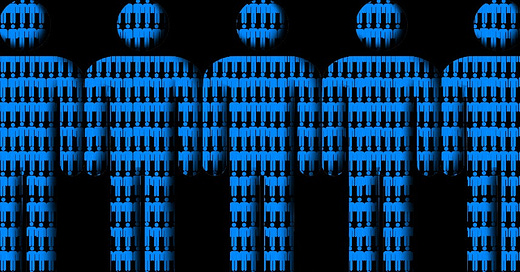Kurzgesagt — maker of some of the best videos on YouTube — is obsessed with ants. They have videos about the Weaver ant and the Slaver ant and the Ant World War. There’s a video about how the Argentine ant got on ships and invaded distant continents, which makes the Argentine ant basically the English, but with more legs.

I find Kurzgesagt’s obsession with ants entirely justified. Ants are incredible; Honey, I Shrunk the Kids engaged in unforgivable ant slander. Ants' social dynamics are complex, and I always find myself wondering what ant societies can teach us about human society. Which brings me to the concept of “emergence”.
Emergence is when a group of things has properties that the individual parts don’t have. So, an example would be cells; cells aren’t people, but many cells together can form tissues that behave differently than individual cells. Tissues, in turn, get together to form organs, and organs form systems, and those systems combine to create character actor Walton Goggins (and also every other human who ever lived). We’re all a series of emergent systems layered on top of each other, and the individual parts of those systems could never deliver a breakout performance in The Righteous Gemstones.

Groups of animals are often emergent systems. You can find emergent properties in a colony of bees, a flock of birds, or a Jonestown of dolphins. Ants are an excellent example of emergence, because — as Kurzgesagt points out — an individual ant is very dumb. They’re so dumb that you don’t even have to use a euphemism like “educationally challenged” to call an ant “dumb”, because they’re even too dumb to get on Twitter and flay you for using insensitive language. But though individual ants are dumb, ants as a species are complex and highly successful. It barely even makes sense to think of an ant as an individual entity; it’s probably more logical to observe ants at the system level, such as the One Million Ants character on Rick & Morty.

Once you’re familiar with the concept of emergence, you see emergent systems everywhere. Economies are emergent systems, as are cities, weather patterns, and even consciousness. Emergence is not limited to a single field of study; it’s part of philosophy, physics, and the social sciences. In fact, since we never look at any object and say “that is an assemblage of quarks and gluons”, basically everything in the universe is — on at least some level — a system.
So what? What am I getting at? I always feel sheepish when I write one of these big-question columns for a blog that is, at its core, a conduit for dick jokes. But I’m writing about emergence because it relates to the revelation that has dominated my early middle-age, which is: I will never, ever know what the fuck I’m doing.
When I was younger, it felt like the knowledge I was collecting might lead to some end point. It seemed likely that I would eventually be able to say “I get it”; there would be some singular concept I would grasp that would more-or-less illuminate most important questions. I don’t know if I ever consciously thought this, but I definitely felt it. I was confused, but that was okay; at some point, things would click and I would basically know what to do.
I now know that won’t ever happen. I’m definitely less stupid than I was in my 20s, but I’m less stupid in the same way trained seal is less stupid than a regular seal; you wouldn’t say that either has any insight about their role in the universe. The best I’ve been able to do is confirm a few basic aphorisms, such as: Liquor before beer, all in the clear; beer before liquor, never been sicker. That’s true. I also know that you should get three bids for any contract work. And that might be literally everything that I know. All my other beliefs exist in the world of probabilities and grey areas, stuff that I might know but that I’m prepared to revise if a belief blows up in my face. As they often do.
This bothers me because, though I’m not especially religious, I’d like to know what I’m supposed to be doing. For example: Is there some career I should pursue that’s objectively “good”? People who work for non-profits think they’re doing good, and surely some are, but the fact that non-profits often have diametrically opposed goals means that everyone can't be on the side of justice. Plus, non-profits have been known to go rocketing off the rails and eventually slide to a stop in the center of Crazytown. Maybe “good” comes from producing things of value, but what does “value” mean? Some consider Ulysses to be the greatest novel ever written, but I’ve tried to read it three times and extracted no value from it whatsoever, whereas I’ve gotten truckloads of value from Weird Al’s Dare to be Stupid. So, even if you set out to create “valuable” work, the definition of value is so difficult to pin down that you won’t necessarily be pointed in any clear direction.
Maybe focusing on work misses the point entirely; maybe the main way people can do good is by raising a family. That must be at least partly true; abandoning my son to the alleys of DC, where he would battle rats for scraps of food, would definitely be bad. So, doing the opposite must be good. But family can’t be the only thing in life; it can’t be true that all we’re supposed to do is make copies of ourselves and then ensure that those copies live long enough to make more copies, still. If that were true, then the most morally upstanding person of all time might be Genghis Kahn, who passed his genes to an absurdly large number of people. Surely, Genghis didn’t murder his way across Asia but emerge as a moral paragon just because he fucked every woman, man, monkey, and log in between the Korean Peninsula and the Black Sea.
So: I don’t know what I’m supposed to do. And I know I won’t figure it out. I wouldn’t call this an existential crisis, but it’s certainly an existential annoyance. I envy people who have clarity of purpose, even if I their purpose seems absolutely bonkers. Jack McNaughton has committed his life to creating paintings that glorify the Trump presidency, and I can’t imagine a stranger calling, but I do envy the clarity of getting up in the morning and thinking: “Today, I must finish my painting of Trump scoring a touchdown while Barack Obama and others fail to tackle him.”

A thought that gives me comfort is that maybe it’s okay to not know anything. If there’s any point to anything — and I don’t know that there is — then maybe it’s fine for all of it to be a mystery to me. You wouldn’t expect a dog to learn algebra, and maybe it would be equally ridiculous to expect me to have any idea what I should do or why.
This thought fits nicely with the idea that humanity is an emergent system. And it seems probable to me that humanity is, indeed, a system. Systems are everywhere in nature, including frequently among animal groups. Furthermore, the thing I think of as “me” is a sub-atomic system leading to an atomic system leading to a molecular system and on and on until presto: Jeff Maurer. It’s not a stretch to think that there might be an additional emergent layer beyond personhood.
It’s worth noting that emergent systems don’t imply mysticism or a divine presence. A hurricane, after all, is a system, but it's just a bunch of rain and wind; if God is present in a hurricane, then it’s the Old Testament “I’m pissed off again” God. Knowledge of emergence shouldn’t lead to Panglossian thinking or a belief in a balanced universe; the presence of emergent systems can lead to destructive chaos like the Ant World War, which frankly makes our world wars look like garden parties. If humans are a system, then that just means we’re a system; higher meaning isn’t implied.
But higher meaning can’t be precluded, either. None of us can rule out the possibility that humans, collectively, are part of a system poised to achieve…something. Something that has some sort of purpose. What that thing might be or what “purpose” means in this context is impossible to say, but — if I may channel Donald Rumsfeld — there are a lot of known unknowns. The parts of a system can be ignorant of the system’s emergent properties, and I sure as hell am ignorant, so if I'm part of some profound system, then the fact that I don't understand anything about that system isn't strange.
Those thoughts, collectively, work for me. They tell me that it might be okay to not know what’s going on. Humanity might have some larger purpose, and if it does, I wouldn’t necessarily know what it is. My resounding confusion is compatible with a universe in which humans generally — and each of us, specifically — have worth. Think of it like a hidden camera show: Yes, you have a role, but you’re don’t know what it is, so really your job is to flail like an idiot until Ashton Kutcher jumps out from behind a bush and explains what the fuck is going on.1
I like thinking of world this way. It takes the pressure off, and it reminds me that things aren’t all about me. Thinking of humanity as a system is also compatible with the idea that the human race is worth preserving, which is something that every religion believes and that atheists do, too, even though they usually don’t like to admit it. If I’m supposed to know what’s going on, then I’ve failed, big-time. But if I’m an ant-like creature playing a role in a system that I can’t possibly understand, then as far as I know, I’m absolutely killing it out there.
Yes, Ashton Kutcher is God in that simile.





I'm a bit further down that road of "life experience" & I still mess up, still have a catalogue of things I don't know... but have come to realize that it's the people who think they know it all who are a danger to society! (like 28-year-old me).
On top of that I've realized that I like to learn, and what can you be learning if there isn't stuff you don't know...
But stepping back to the big picture of humanity as a self-sustaining system, it's the urge to both reproduce and ensure that fellow humans are sufficiently developed to not do totally daft things all the time that keeps "humanity" going as a thing (yes some slip through the cracks; so humanity invented politics to keep the nutters occupied, and democracy so that no one bunch of nutters gets to run things for too long).
So investing yourself in your family is really what "the system" wants you to do - and you are probably wired to be fulfilled by that. And to be honest your family are probably the only lives you will really be able to influence, unless you also happen to be a mass murderer.
An idea that I keep coming back to (but that I haven’t yet articulated well) is that “meaning is dependent on scale.” This essay is a great addition to that intuition, so thanks for that.